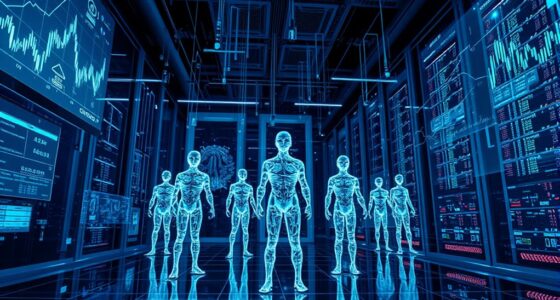Teaching skills AI can’t replace is now your biggest task because qualities like empathy, creativity, and ethical judgment remain uniquely human. These skills are essential for building trust, inspiring others, and steering through complex situations that require nuanced decision-making. You need to focus on cultivating emotional intelligence, problem-solving, and social skills to stay relevant in a changing world. If you want to discover effective ways to develop these vital abilities, there’s much more to explore ahead.
Key Takeaways
- Prioritize developing emotional intelligence to foster genuine human connections AI cannot authentically replicate.
- Focus on teaching creativity, innovation, and complex problem-solving that require imagination beyond data-driven algorithms.
- Enhance leadership and ethical judgment skills to guide teams and make value-based decisions in uncertain or nuanced situations.
- Cultivate social and interpersonal skills essential for managing relationships, trust, and conflict resolution AI cannot effectively emulate.
- Emphasize emotional labor and empathy training to build authentic trust and rapport in roles like caregiving, counseling, and customer service.

While AI has made significant advances in many fields, teaching skills that rely on human connection remain beyond its reach. You know that empathy and understanding emotions are at the core of professions like counseling, HR, and customer service. AI struggles to replicate genuine human connection because it can’t truly understand or respond to subtle emotional cues. Building trust and rapport are deeply human skills; they depend on authentic relationships that AI can’t form. This emotional intelligence is a top skill that can’t be automated, especially when roles require conflict resolution or nuanced communication. Success in sales, management, and caregiving relies heavily on reading and adapting to people’s emotional states—something AI doesn’t do well. Managing your own emotions to influence others positively, known as emotional labor, is a human advantage that remains unmatched in service and leadership roles. According to recent studies, emotional intelligence remains a critical differentiator in effective human interactions. Developing emotional awareness is essential for nurturing authentic connections and is a key component that AI cannot genuinely replicate. Creativity and innovation are equally resistant to automation. Your ability to solve problems creatively and generate new ideas is highly valued in marketing, design, and R&D, where AI mainly assists rather than leads. Coming up with solutions beyond existing data requires imagining possibilities that AI can’t conceive. Industries centered on artistic expression—music, writing, visual arts—prioritize human creativity over algorithmic output. Connecting unrelated concepts to invent new products or services is a uniquely human trait. Entrepreneurship and startup cultures thrive on risk-taking and unconventional thinking—qualities that are difficult for AI to emulate. Leadership and strategic vision also depend on human qualities. Inspiring and motivating teams, setting long-term goals, and establishing ethical standards require human judgment and values. Charting ambiguity and making decisions with incomplete information are strengths of experienced leaders, not AI. Crisis management and adaptability in unpredictable situations showcase human resilience. Cultivating organizational culture and values remains a human task, as AI can’t embody or propagate a company’s ethos. Finally, complex decision-making involving ethics, law, or morality demands nuanced human judgment. Interpreting gray areas in healthcare, law, or governance involves balancing logic, ethics, and empathy—capacities AI can’t fully grasp. Your social and interpersonal skills are essential in managing perceptions, navigating crises, and building trust. These uniquely human abilities are what make teaching skills that AI can’t replace your biggest challenge—and opportunity.
Frequently Asked Questions
How Can Educators Identify Uniquely Human Skills for Teaching?
You can identify uniquely human skills by analyzing real-world problems that need ethical judgment, empathy, and creativity. Use project-based learning to observe how students engage with complex social issues, and consult frameworks like the Human Skills Matrix to map their abilities in thinking, managing, and leading. Collaborate with industry experts and conduct assessments to evaluate skills like ethical reflection, collaboration, and innovation, ensuring you’re teaching qualities AI can’t replicate.
What Are the Most Resilient Skills in the Age of AI?
You’ll find that skills like emotional intelligence, critical thinking, creativity, and effective communication are the most resilient in the age of AI. These human abilities involve empathy, nuanced judgment, and cultural understanding that AI can’t replicate. By honing these skills, you can stay adaptable and valuable, guiding teams, inspiring innovation, and providing personalized care that machines simply can’t imitate. Your ability to connect and think deeply remains irreplaceable.
How Will Human Interaction Evolve With Increasing AI Integration?
As AI integration deepens, your human interactions will evolve through increased collaboration, enhanced communication, and shared decision-making. You’ll rely more on emotional intelligence, empathy, and nuanced understanding to nurture relationships. You’ll adapt by fostering genuine connections, embracing collaborative problem-solving, and steering through new social norms. You’ll find yourself engaging in more meaningful conversations, building trust, and cultivating intimacy—shifting from transactional exchanges to authentic, co-evolved human-AI interactions that enhance your social fabric.
Can Emotional Intelligence Be Effectively Taught by AI?
Yes, AI can help teach emotional intelligence by providing personalized feedback, creating realistic scenarios, and evaluating emotional responses accurately. You can use AI tools to practice recognizing emotions and developing empathy in controlled environments. However, AI can’t replace genuine human connection, empathy, and nuanced understanding. As a learner, you’ll benefit most when AI supports human teachers, helping you refine emotional skills through data-driven insights and simulated interactions.
What Role Will Creativity Play in Future Education Systems?
Creativity will be central to future education systems, shaping how students solve problems and innovate. With 87% of teachers and 77% of parents recognizing its positive impact, you’ll see creativity integrated across subjects, especially through STEAM initiatives. Technology, like AI and digital media, will amplify creative expression. You’ll need to develop your creative skills continuously, as they’ll be essential for success in an evolving, interconnected world.
Conclusion
As you focus on teaching skills AI can’t replace, you might find yourself unexpectedly inspired by a simple moment—like sharing a genuine laugh with a student or noticing creativity spark in a conversation. These small, human touches remind you that amid all the technology, it’s the connections and empathy you bring that truly set you apart. Coincidentally, in nurturing these uniquely human skills, you’re shaping a future only you can create.










